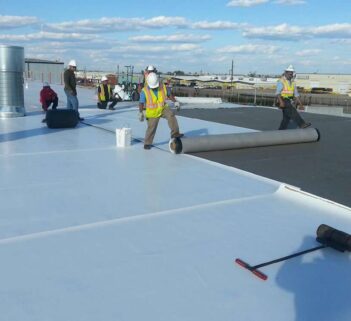
Thermoplastic Polyolefin
(TPO)
Get A NO OBLIGATION
Commercial Roof Estimate!
Get A NO OBLICATION
Commercial Roof Estimate!

Thermoplastic Polyolefin (TPO)

Thermoplastic polyolefin (TPO) is a type of roofing material that is commonly used on flat or low-sloped roofs, including on commercial buildings. Thermoplastic Polyolefin is a single-ply roofing membrane that is one of the fastest-growing commercial roofing systems on the market. TPO roofing systems are a single layer of synthetics and reinforcing scrim used to cover flat roofs.
TPO roofing systems are known for their durability, flexibility, and resistance to UV radiation, extreme temperatures, and weathering. They are also resistant to punctures, tears, and other types of physical damage. TPO roofing systems are typically installed by unrolling the membrane and attaching it to the roof deck using adhesive, mechanical fasteners, or a combination of both. The seams of the membrane are then sealed using heat welding or a special tape or sealant to create a waterproof barrier.

TPO Roofing Installation
After the existing substrate is prepared, either by cleaning or removing the existing roof, the insulation is installed. There are a few types of insulation options the facility manager/owner can choose from:
The TPO membrane can be attached to the cover board with a bonding adhesive or mechanically fastened. When the membrane is rolled out, the contractor returns and uses a hot-air gun to weld the seams together.
Advantages Of TPO Roofing
A commercial single-ply membrane roof can last 30 years if properly installed and maintained. There are quite a few other benefits of single-ply membrane roofing systems:
Read More about TPO in our Blog | Sustainability and TPO Roofing: Expert Opinions on Eco-Friendly Roofing Solutions
Get A NO OBLIGATION Commercial Roof Estimate!
Get A NO OBLICATION
Commercial Roof Estimate!

Estimate
Get A NO OBLIGATION
Commercial Roof Estimate!
Get A NO OBLICATION
Commercial Roof Estimate!

News


Contact
855-862-7663